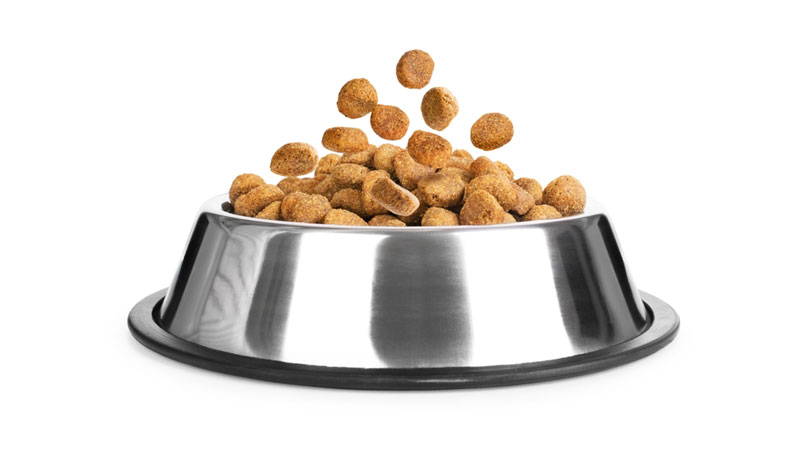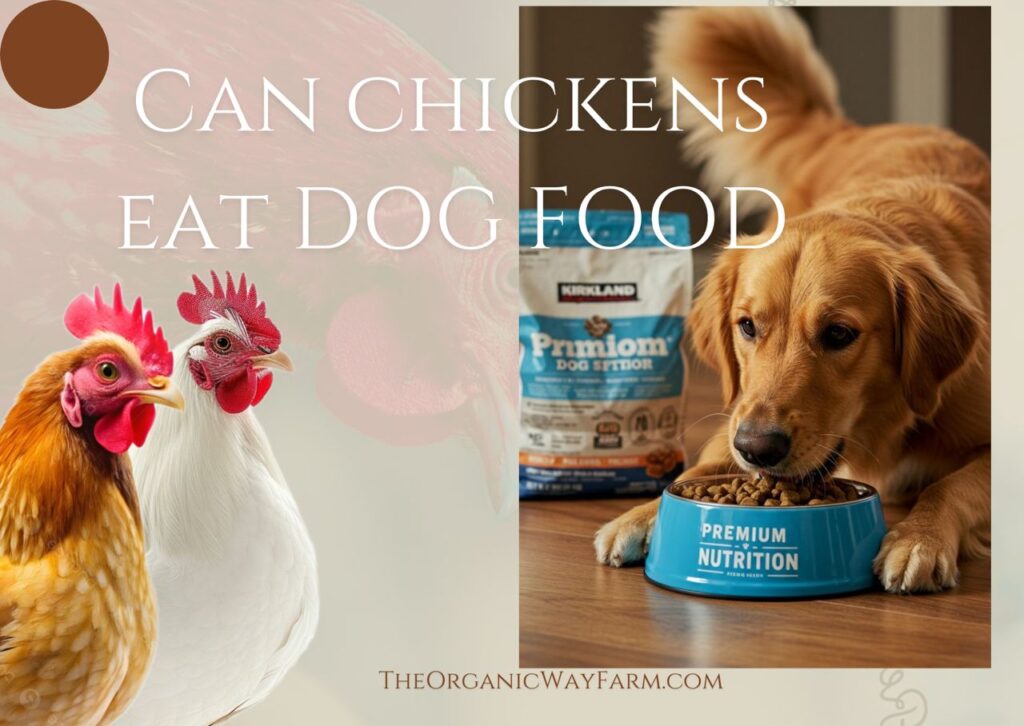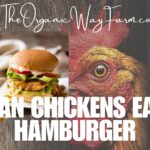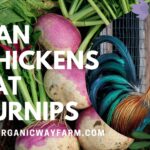If you have feathered friends like chickens, you may wonder about their diet beyond regular chicken feed. Chickens can be curious creatures, and sometimes they manage to sneak a bite of pet food. The question we often hear is “Can chickens eat dog food?” Well, let’s explore this subject together and find out more about sharing dog food with our clucking companions.
The answer is YES, chickens can eat dog food. However, we need to keep in mind that dog food is not specifically designed for chickens, so it should be given in moderation. Just like we wouldn’t want to eat the same meal every day, chickens also benefit from variety in their diet. So, how much can they safely consume, and what are the best ways to feed it to them?
Stick around as we unravel this and learn about the benefits and dangers of letting our chickens have dog food as well as exploring some tasty substitutes to keep them happy and healthy!
- Can Chickens Eat Dog Food?
- How Much Dog Food Can Chickens Eat?
- Best Way to Feed Dog Food to Chickens
- Benefits of Feeding Dog Food to Chickens
- Risks of Feeding Too Much Dog Food to Chickens
- Substitutes for Dog Food for Chickens
Can Chickens Eat Dog Food?

When it comes to our beloved chickens, their dietary needs are unique. Chickens thrive on a balanced diet filled with grains, vegetables, and proteins that cater to their specific requirements. Dog food, while not poisonous, should be treated with caution. Understanding what is in dog food is helpful. Most commercial dog foods are made from protein sources such as meat, fish, or plant-based proteins along with grains, vitamins, and minerals. While some of these ingredients are beneficial for our feathered friends, others may not align with their dietary needs.
Chickens primarily require protein to support their growth and egg production. Dog food can provide a source of protein, but we should always check the protein level to ensure it’s appropriate for chickens. A good rule of thumb is that chicken diets typically require about 16-18% protein. Therefore, if dog food contains high protein levels, it may contribute well to their diet; however, lower protein content might not make it effective as a staple food.
How Much Dog Food Can Chickens Eat?
Feeding dog food to chickens should be done with care. A small amount can serve as a treat and supplements their diet without overwhelming them. A practical approach is to provide no more than 10% of their overall diet as dog food. This way, we can ensure they’re still getting the essential nutrients they need from other sources.
For example, if you’re feeding your chickens one cup of feed daily, about 1/10 of that cup can be dog food. Monitoring how our chickens react to the dog food is important. If they show signs of distress or refuse to eat it, it might not be the right fit.
We also shouldn’t forget that chickens enjoy their food variety! Mixing treats like fruits and vegetables into their home-cooked meals can be far more beneficial than relying solely on dog food. This prevents them from developing a preference for just one type of food, which can lead to nutritional deficiency.
When we think about transitioning to any new food, including dog food, we can always do it gradually. Mixing some dog food with their usual feeds can help them get used to the taste and texture, allowing for a smoother transition. This method also allows us to keep a close eye on their well-being, seeing if any adverse reactions occur initially.
Best Way to Feed Dog Food to Chickens
Finding the best method to feed dog food to our chickens can turn their mealtime into an enjoyable experience. One approach is to mix dry dog food with their regular feed. This combination can provide texture and variety in one bowl! It makes feeding time more fun for them while ensuring they get their essential nutrients.
We should consider soaking the dog food in water before serving it to the chickens. This technique softens the kibble and can make it easier for them to chew and digest. Plus, if you have younger or older hens, they may benefit greatly from this texture change, making it less of a challenge for them to consume.
Another important aspect is the feeding vessel. If we are using a feeder, it should allow the chickens to access the food without too much hassle, as we want to minimize food waste. A tray or shallow bowl can work well for dog food, keeping it accessible while also preventing it from being knocked over.
Feeding time can also provide enrichment! We can scatter dog food on the ground or introduce a foraging area for chickens. This encourages their natural instincts to scratch, peck, and look for food, keeping them mentally stimulated and happy.
Benefits of Feeding Dog Food to Chickens
Hydration
Keeping our chickens hydrated is essential, and providing dog food that is soaked can help achieve this. When we soak dry dog food, it absorbs water, allowing the chickens to consume more water while eating. This is particularly beneficial in hot weather when chickens may be reluctant to drink enough water, which can lead to dehydration. Proper hydration supports good health and promotes egg production as well.
Fiber
Fiber is an essential component in chicken diets, aiding digestion and ensuring they process their food correctly. Some dog food brands offer fiber-rich varieties that can positively contribute to their digestive health. However, we should make sure that the fiber contained in the dog food comes from quality ingredients, such as whole grains or vegetables, to ensure they are getting the best possible fiber sources.
Vitamins and minerals
Another notable benefit is the range of vitamins and minerals found in dog food. Chicken diets require various vitamins such as A, D, and E, along with essential minerals like calcium and phosphorus. Dog food may contain some of these vitamins and minerals, so it can be beneficial if your chickens are lacking certain nutrients. Utilizing dog food as an occasional supplement can help prevent deficiencies and support overall health. However, knowing what’s included in their primary diet and making sure it is balanced is still important.
Mental stimulation
We should remember that chickens need mental stimulation just as much as they need physical activity. Providing different food types, including dog food, can spark their curiosity! Chickens are natural foragers who love to scratch the ground for hidden rewards. Introducing dog food among other feed can promote this behavior, leading to a more active and enriched life for our hens.
Risks and Dangers of Feeding Dog Food to Chickens
While dog food might seem like a good option at times, we must be aware of potential risks. One significant concern arises from the nutritional imbalance dogs and chickens have. Chicken feed is specially formulated to meet the dietary needs of chickens, whereas dog food caters to the different needs of dogs. Regularly feeding dog food can lead to imbalances if it becomes a dominant part of their diet.
Another danger comes from processed aspects of dog food. Many dog foods contain preservatives, artificial flavors, and additives that may not be suitable for chickens’ sensitive stomachs. If we’re unsure about the ingredients in the dog food, it’s better to be cautious and avoid inclusion in their diet. Long-term ingestion of suboptimal additives can disturb their gut health and overall well-being.
We also want to create a safe environment for our chickens, as they can easily choke on larger kibble sizes. Monitoring how chickens interact with the dog food helps us prevent any emergencies. If we find that they prefer larger kibble, we might consider breaking it down into smaller pieces before feeding.
Substitutes for Dog Food for Chickens
Finding a great alternative to dog food is essential for your flock’s health. Luckily, there is an array of options available! Many vegetables and fruits are safe for chickens to eat. For instance, scraps of lettuce, cucumbers, watermelon, or peas can make for juicy and nutritious treats. It’s important to ensure fruits and vegetables aren’t wilted or spoiling before serving!
Grains can also make valuable substitutes. Cooked rice, oats, or whole grains can serve as excellent sources of carbohydrates that will fuel our chickens. Similar to dog food, we should provide these in moderation within the overall feed to maintain balance.
Moreover, we can also check out chicken feed brands that offer high-protein options suitable for our feathered friends to replace dog food altogether. These formulas are made with chicken nutrition in mind and can supply adequate proteins, vitamins, and minerals in a safe manner.
Frequently Asked Questions
Is dog food unhealthy for chickens?
Occasional consumption of dog food can be acceptable, but it shouldn’t become a staple. A diet focused entirely on dog food lacks essential nutrients meant for chickens and could lead to health issues.
Can chickens eat wet dog food?
Yes! Wet dog food can provide extra moisture and make it easier for chickens to eat. Again, moderation is key!
What is the best dog food for chickens?
Look for dog food that contains high-quality proteins and is free from artificial preservatives. Avoid any dog food high in fillers as they may not provide sufficient nutrition!
Will chickens eat dog food if they don’t like it?
Chickens can be picky. If they refuse to eat dog food, it might not align with their palate. Mixing with regular feed or trying different textures can help.
Can chicken digest dog food easily?
Chickens can digest dog food, but it depends on the ingredient quality! Monitoring their digestive health during introduction is crucial.
Final Thoughts
In conclusion, it’s possible to include dog food in our chickens’ diets, but we should do it thoughtfully. Balancing their diet with different food sources, while keeping a watchful eye on their health, is essential for their happiness and productivity. Chicken care is a rewarding experience when we ensure our flock gets the best nutrition possible!
If anything in this article piqued your interest, why not explore even more topics like can chickens eat grapes? There is always so much to learn about caring for our feathery friends!






